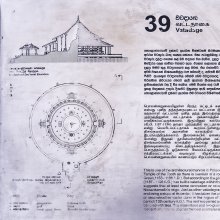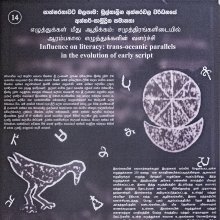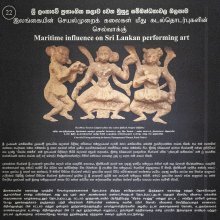Vartamana, Vartamāna, Vartamānā: 11 definitions
Introduction:
Vartamana means something in Hinduism, Sanskrit, the history of ancient India, Marathi, Hindi. If you want to know the exact meaning, history, etymology or English translation of this term then check out the descriptions on this page. Add your comment or reference to a book if you want to contribute to this summary article.
Images (photo gallery)
In Hinduism
Vyakarana (Sanskrit grammar)
Source: Wikisource: A dictionary of Sanskrit grammarVartamāna (वर्तमान).—The present tense; cf वर्तमाने लट् (vartamāne laṭ) P.III.2.123; cf.also क्तस्य च वर्तमाने (ktasya ca vartamāne) PII 3.67;also वर्तमानसामीप्ये वर्तमानवद्वा (vartamānasāmīpye vartamānavadvā) P. III. 3.131.
--- OR ---
Vartamānā (वर्तमाना).—A term used by ancient grammarians for the present tense, along with the term वर्तमान (vartamāna) also; cf. यदा हि बुद्धिकर्म तदा वर्तमाना भाबष्यति (yadā hi buddhikarma tadā vartamānā bhābaṣyati), M.Bh. on P. III.3.133 Vart.8.

Vyakarana (व्याकरण, vyākaraṇa) refers to Sanskrit grammar and represents one of the six additional sciences (vedanga) to be studied along with the Vedas. Vyakarana concerns itself with the rules of Sanskrit grammar and linguistic analysis in order to establish the correct context of words and sentences.
Shaktism (Shakta philosophy)
Source: Google Books: ManthanabhairavatantramVartamāna (वर्तमान) refers to the “present”, according to the Ṭīkā (commentary) on the Manthānabhairavatantra, a vast sprawling work that belongs to a corpus of Tantric texts concerned with the worship of the goddess Kubjikā.—Accordingly, “[...] Thus, the future, the present (vartamāna) and the past are said to be born from the right (eye) (vāma-udbhūta), the forehead and the left (eye), respectively. Once these lineages have been learnt with effort, that is, (fully) understood and (one is) certain (of their nature), then one should perform the consecration. [...]”..

Shakta (शाक्त, śākta) or Shaktism (śāktism) represents a tradition of Hinduism where the Goddess (Devi) is revered and worshipped. Shakta literature includes a range of scriptures, including various Agamas and Tantras, although its roots may be traced back to the Vedas.
India history and geography
Source: Cologne Digital Sanskrit Dictionaries: Indian Epigraphical GlossaryVartamāna.—(HRS), ‘running revenue’, as suggested by the Arthaśāstra. Note: vartamāna is defined in the “Indian epigraphical glossary” as it can be found on ancient inscriptions commonly written in Sanskrit, Prakrit or Dravidian languages.

The history of India traces the identification of countries, villages, towns and other regions of India, as well as mythology, zoology, royal dynasties, rulers, tribes, local festivities and traditions and regional languages. Ancient India enjoyed religious freedom and encourages the path of Dharma, a concept common to Buddhism, Hinduism, and Jainism.
Languages of India and abroad
Marathi-English dictionary
Source: DDSA: The Aryabhusan school dictionary, Marathi-Englishvartamāna (वर्तमान).—f -
--- OR ---
vartamāna (वर्तमान).—n News. a Extant. Present. vartamānakāla The present tense.
Marathi is an Indo-European language having over 70 million native speakers people in (predominantly) Maharashtra India. Marathi, like many other Indo-Aryan languages, evolved from early forms of Prakrit, which itself is a subset of Sanskrit, one of the most ancient languages of the world.
Sanskrit dictionary
Source: DDSA: The practical Sanskrit-English dictionaryVartamāna (वर्तमान).—a. [vṛt-śānac]
1) Being, existing.
2) Living, being alive, contemporary; प्रथितयशसां भासकविसौमिल्लकवि- मिश्रादीनां प्रबन्धानतिक्रम्य वर्तमानकवेः कालिदासस्य क्रियायां कथं परिषदो बहुमानः (prathitayaśasāṃ bhāsakavisaumillakavi- miśrādīnāṃ prabandhānatikramya vartamānakaveḥ kālidāsasya kriyāyāṃ kathaṃ pariṣado bahumānaḥ) M.1.
3) Turning or moving round, revolving.
4) Dwelling in.
-naḥ The present tense (in gram.); वर्तमानसामीप्ये वर्तमानवद्वा (vartamānasāmīpye vartamānavadvā) P.111.3.131.
-nam 1 Presence.
2) The present time.
Source: Cologne Digital Sanskrit Dictionaries: Cappeller Sanskrit-English DictionaryVartamāna (वर्तमान).—[adjective] going on, present; [neuter] = kāla [masculine] the present time.
Source: Cologne Digital Sanskrit Dictionaries: Monier-Williams Sanskrit-English Dictionary1) Vartamāna (वर्तमान):—[from varta] mfn. turning, moving, existing, living, abiding etc.
2) [v.s. ...] present, [Kātyāyana-śrauta-sūtra]
3) Vartamānā (वर्तमाना):—[from vartamāna > varta] f. the terminations of the present tense, [Kātantra]
4) Vartamāna (वर्तमान):—[from varta] n. presence, the present time, [Kāvya literature; Bhāgavata-purāṇa]
5) [v.s. ...] (in gram.) the present tense.
[Sanskrit to German]
Sanskrit, also spelled संस्कृतम् (saṃskṛtam), is an ancient language of India commonly seen as the grandmother of the Indo-European language family (even English!). Closely allied with Prakrit and Pali, Sanskrit is more exhaustive in both grammar and terms and has the most extensive collection of literature in the world, greatly surpassing its sister-languages Greek and Latin.
Hindi dictionary
Source: DDSA: A practical Hindi-English dictionaryVartamāna (वर्तमान) [Also spelled vartman]:—(a) present, existing; current; (nm) the present; hence ~[tā] (nf); —[kāla] the present tense (in Grammar); —[samaya] the present.
...
Kannada-English dictionary
Source: Alar: Kannada-English corpusVartamāna (ವರ್ತಮಾನ):—
1) [adjective] running; current.
2) [adjective] accepted, followed at present; being in vogue.
3) [adjective] now going on; now in progress; happening at the present time.
--- OR ---
Vartamāna (ವರ್ತಮಾನ):—
1) [noun] a man engaged in any vocation.
2) [noun] a happening or occurrence; an event.
3) [noun] new information about anything; information previously unknown; news.
4) [noun] the state or fact of existing or living; being; existence.
5) [noun] (gram.) the tense that indicates an action now taking place; present tense.
Kannada is a Dravidian language (as opposed to the Indo-European language family) mainly spoken in the southwestern region of India.
Nepali dictionary
Source: unoes: Nepali-English DictionaryVartamāna (वर्तमान):—adj. 1. existing; being; present; of the present day; 2. current;
Nepali is the primary language of the Nepalese people counting almost 20 million native speakers. The country of Nepal is situated in the Himalaya mountain range to the north of India.
See also (Relevant definitions)
Starts with: Vartamana-bhavishyat, Vartamanagati, Vartamanakala, Vartamanakalata, Vartamanakavi, Vartamanakriye, Vartamanakshepa, Vartamananyuna, Vartamanapatra, Vartamanapatrike, Vartamanata, Vartamanatva, Vartamanavat.
Query error!
Full-text (+53): Avartamana, Vartamanakala, Vartamanakshepa, Vartamanata, Vartamanapatra, Vartamanakavi, Satatya-vartamana, Samanya-vartamana, Vartamanavat, Vartamanagati, Vartamana-bhavishyat, Samyagvartamana, Vartamanika, Vartamanatva, Galivartamana, Tamtivartamana, Purnavartamanakala, Bhuta-bhavishyad-vartamana-nihshesha-adatya-sahita, Vartamanakriye, Vartamananyuna.
Relevant text
Search found 72 books and stories containing Vartamana, Vartamāna, Vartamānā; (plurals include: Vartamanas, Vartamānas, Vartamānās). You can also click to the full overview containing English textual excerpts. Below are direct links for the most relevant articles:
Garga Samhita (English) (by Danavir Goswami)
Verse 4.18.13 < [Chapter 18 - The Names and Worship of Srī Yamunā]
Verse 4.11.15 < [Chapter 11 - The Story of the Gopīs that were Residents of...]
Verse 1.1.22 < [Chapter 1 - Description of Śrī-Kṛṣṇa’s Glories]
Brihat Jataka by Varahamihira [Sanskrit/English] (by Michael D Neely)
Verse 8.22 < [Chapter 9 - Ashtakavarga]
Rig Veda (translation and commentary) (by H. H. Wilson)
Preksha meditation: History and Methods (by Samani Pratibha Pragya)
3.3. Three Special Limbs < [Chapter 4 - Theory and Methods of Prekṣā-Dhyāna]
6. Conclusion to chapter 4 < [Chapter 4 - Theory and Methods of Prekṣā-Dhyāna]
Brihad Bhagavatamrita (commentary) (by Śrī Śrīmad Bhaktivedānta Nārāyana Gosvāmī Mahārāja)
Verse 2.1.39 < [Chapter 1 - Vairāgya (renunciation)]
Verse 1.7.39-40 < [Chapter 7 - Pūrṇa (pinnacle of excellent devotees)]
Verse 2.1.138-140 < [Chapter 1 - Vairāgya (renunciation)]
Chandogya Upanishad (english Translation) (by Swami Lokeswarananda)


